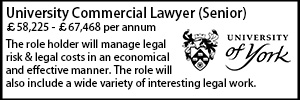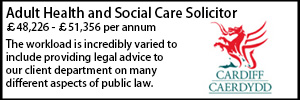Department for Education consults on register of children not in school
- Details
The Government is to consult on plans for a register of children not in school, saying it would enable councils to act effectively if they have concerns for a child's education.
According to the Department for Education, estimates suggest almost 60,000 children are deemed to be educated at home – “a figure that is thought to be rising by around a quarter every year”.
The DfE claimed a register of children not in school would “transform a local council’s capacity to identify and intervene where the standard of a child’s education isn’t good enough or, in the rare instances, where they are at risk of harm”.
It will also help the authorities spot young people who may be receiving a solely religious education, attending an unregistered school or not receiving an education at all, the Department added.
Under the plans, it will be parents’ responsibility to register their child if they are not being taught in a state-funded or registered independent school.
The DfE has also proposed new measures to support parents who choose to educate their children at home, in the form of a legal duty for local authorities to provide assistance such as teaching resources of financial contributions to exam fees.
The Government has meanwhile published guidance for local authorities and for parents aimed at clarifying their powers and responsibilities under current law, setting out the action councils can take if they have concerns a child is not receiving a suitable education. This includes school attendance orders through which parents can be compelled to send their child to a registered school.
The consultation, which can be viewed here, runs until 24 June 2019.
Education Secretary Damian Hinds said: “The term ‘home education’ has now acquired a much broader meaning than it used to. It is now a catch-all phrase, used to refer to all children not in a registered school. So whilst this does include those actually getting a really good education at home, it also includes children who are not getting an education at all, or being educated in illegal schools where they are vulnerable to dangerous influences – the truth is, we just don’t know.
“As a Government, we have a duty to protect our young people and do our utmost to make sure they are prepared for life in modern Britain. That’s why this register of children not in school is so important – not to crack down on those dedicated parents doing an admirable job of educating their children in their own homes, but to prevent vulnerable young people from vanishing under the radar.”
Hinds added: “Parents who choose to teach their children at home have often made huge sacrifices – even giving up their careers – so that they can do what is best for their families. I want to make those parents’ lives easier and help them provide the best education for their children.
“I also want to hear from home educating parents so we can understand what support they would benefit from and how we can help them and their children flourish.”
Children’s Commissioner Anne Longfield said: “The number of children who are not being educated in school has rocketed over recent years. For some families, educating at home will be a positive choice but many more children are falling out of school and their parents struggling on their own.
“It is vitally important that we know that all children are safe and that they are receiving the education they deserve to help them to succeed in life. The introduction of a register for children not in school is very welcome and something I been calling for. I am pleased these proposals also include support for families.”
Rachel Dickinson, President of the Association of Directors of Children’s Services, said: “We welcome the proposals outlined today for a register of all children not educated at a registered school. Education is a fundamental right for all children and we absolutely recognise that parents have the right to educate their children at home.
“Where they opt to do this, we want it to be a positive experience for both children and their parents, yet for too long we have had no way of assuring ourselves of whether a growing number of children are receiving a suitable education or that they are safe – last year we calculated nearly 80,000 children were educated at home at some point across the 2017/18 academic year.”
Dickinson added: “Whilst a register in and of itself will not keep children safe, it will help to establish exactly how many children are being educated other than at school and assist with the identification of children who are vulnerable to harm. We look forward to reading the new guidance, which hopefully includes a clearer articulation of what a suitable education looks like as well as more detail on this proposal.
“This is a positive step in the right direction but it is crucial that any new responsibilities for local authorities are fully funded if these plans are to have the desired impact. ADCS will be formally responding to the consultation in due course.”










































